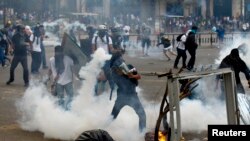CARACAS —
A Chilean woman was shot dead while clearing a barricade put up by anti-government protesters, the first foreign fatality during a month of civil unrest in Venezuela, authorities said on Monday.
The death of Gisela Rubilar, 47, who was studying in the western Venezuelan city of Merida, brought to at least 21 the total number of fatalities in five weeks of demonstrations against President Nicolas Maduro's government.
“She was ambushed by extreme right-wing groups... She was vilely murdered with a shot in the eye,” Alexis Ramirez, the governor of Merida state, told reporters, blaming the killing on unidentified demonstrators in the Andean city.
Students and militant opponents of Maduro have been maintaining street barricades in various cities since last month, demanding the president's resignation and solutions to problems of rampant crime and economic shortages.
The barricades have become frequent flashpoints for violence between protesters, security forces and government supporters.
People from both sides of the political divide as well as members of the security forces have been among the victims of the country's worst unrest in a decade.
Venezuelan authorities said Rubilar was a mother of four and a member of the ruling Socialist Party. A classmate told Reuters she was studying higher education, had lived in Merida for six years and worked as an artisan.
“We've asked the Venezuelan government to investigate and give us all the information about the circumstances and cause of this death,” said Chilean President Sebastian Pinera.
Overthrow unlikely
Though street protests helped briefly topple the late socialist leader Hugo Chavez in a botched 2002 coup, there seems little chance the current unrest could lead to a Ukraine-style overthrow of his successor, Maduro.
The military, which played a crucial role in 2002, appears firmly behind Maduro. Opposition leaders are also split between militants who back the street action and moderates who believe that tactic risks violence and lacks widespread acceptance among Venezuelans.
The ongoing, daily protests are a mix of peaceful demonstrations and violent exchanges between security forces and hooded protesters hurling rocks and Molotov cocktails.
Pro- and anti-government medical personnel held rival rallies in Caracas on Monday.
Earlier on Monday, the army announced it had raided a parking garage under Caracas' Altamira Square - a stronghold of opposition protests - and found a store of water, food, medicine, helmets and other equipment destined to keep the demonstrations going. Eleven people were arrested, the authorities said.
An increasingly confident-looking Maduro told supporters that the protesters had been defeated.
“We have faced a coup and neutralized it,” he said.
But students are vowing to stay on the street indefinitely in what could be a protracted period of instability for Venezuela's 29 million people.
More than 1,300 have been arrested during the unrest, with 92 still behind bars, according to the government. More than 300 people have been injured during the unrest.
The death of Gisela Rubilar, 47, who was studying in the western Venezuelan city of Merida, brought to at least 21 the total number of fatalities in five weeks of demonstrations against President Nicolas Maduro's government.
“She was ambushed by extreme right-wing groups... She was vilely murdered with a shot in the eye,” Alexis Ramirez, the governor of Merida state, told reporters, blaming the killing on unidentified demonstrators in the Andean city.
Students and militant opponents of Maduro have been maintaining street barricades in various cities since last month, demanding the president's resignation and solutions to problems of rampant crime and economic shortages.
The barricades have become frequent flashpoints for violence between protesters, security forces and government supporters.
People from both sides of the political divide as well as members of the security forces have been among the victims of the country's worst unrest in a decade.
Venezuelan authorities said Rubilar was a mother of four and a member of the ruling Socialist Party. A classmate told Reuters she was studying higher education, had lived in Merida for six years and worked as an artisan.
“We've asked the Venezuelan government to investigate and give us all the information about the circumstances and cause of this death,” said Chilean President Sebastian Pinera.
Overthrow unlikely
Though street protests helped briefly topple the late socialist leader Hugo Chavez in a botched 2002 coup, there seems little chance the current unrest could lead to a Ukraine-style overthrow of his successor, Maduro.
The military, which played a crucial role in 2002, appears firmly behind Maduro. Opposition leaders are also split between militants who back the street action and moderates who believe that tactic risks violence and lacks widespread acceptance among Venezuelans.
The ongoing, daily protests are a mix of peaceful demonstrations and violent exchanges between security forces and hooded protesters hurling rocks and Molotov cocktails.
Pro- and anti-government medical personnel held rival rallies in Caracas on Monday.
Earlier on Monday, the army announced it had raided a parking garage under Caracas' Altamira Square - a stronghold of opposition protests - and found a store of water, food, medicine, helmets and other equipment destined to keep the demonstrations going. Eleven people were arrested, the authorities said.
An increasingly confident-looking Maduro told supporters that the protesters had been defeated.
“We have faced a coup and neutralized it,” he said.
But students are vowing to stay on the street indefinitely in what could be a protracted period of instability for Venezuela's 29 million people.
More than 1,300 have been arrested during the unrest, with 92 still behind bars, according to the government. More than 300 people have been injured during the unrest.








